The excitement was building among the audience in the sweltering club as it eagerly awaited that evening’s star turn: Husband-and-wife musical duo Ike and Tina Turner.
Little did those in the young crowd know of the drama that was already taking place backstage on that night in the heart of the American Deep South.
Because as her fans waited, Tina – then a relatively unknown female singer – had made a shocking admission to her friend Robbie Montgomery: Just the night before, her husband had erupted into a terrifying rage and violently assaulted her.
The evidence was right in front of Robbie’s eyes in the ugly bruises that marred her friend’s face and neck, as well as the fact that she was clearly still in significant physical pain.
‘She wasn’t the type to cry and whine that she got beat up. She said, “I’m okay, I’m okay,” and went off to do her make-up and hide the damage,’ Robbie says today, talking for the first time since her friend’s death.
The excitement was building among the audience in the sweltering club as it eagerly awaited that evening’s star turn: Husband-and-wife musical duo Ike (left) and Tina Turner (right)
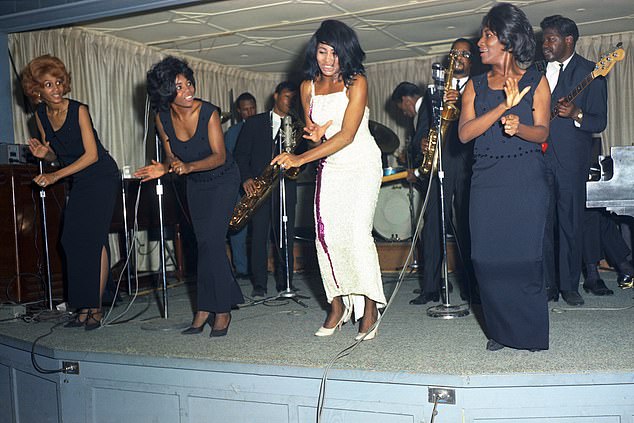
Little did those in the young crowd know of the drama that was already taking place backstage on that night in the heart of the American Deep South
‘She knew she had to do the show whether they’d had a fight or not. She went on stage and did her usual energetic routine and the audience didn’t suspect a thing. This happened many times.’
Since music legend Tina Turner died at the age of 83 at her home in Switzerland, tributes have poured in for the singer who sold more than 100million albums in her six-decade career.
Along with praise for her musical legacy, fans have remembered how the iconic star broke the silence surrounding domestic abuse.
First speaking out in 1981, Tina described how she suffered at the hands of Ike – who threw hot coffee at her, beat her with household objects and broke her jaw and nose – and how she considered suicide before finally fleeing after 16 years of marriage, then becoming destitute and homeless.
When the singer found international stardom in the second phase of her career, she continued to talk with searing honesty about her brutal experiences in order to inspire other women to flee abusive relationships.
In those early, vicious days of Ike and Tina’s relationship, Robbie, as a backing singer to the couple, was a regular bystander.
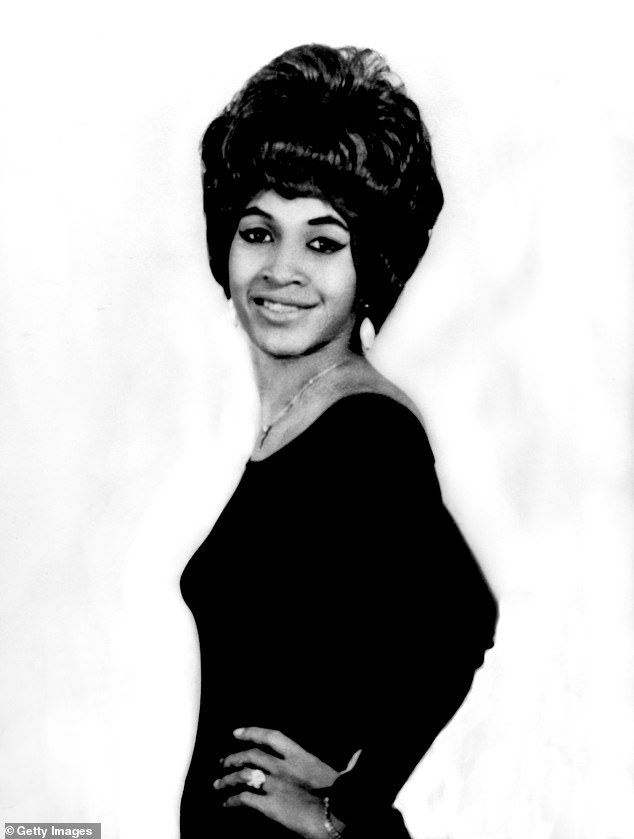
In those early, vicious days of Ike and Tina’s relationship, Robbie (pictured), as a backing singer to the couple, was a regular bystander
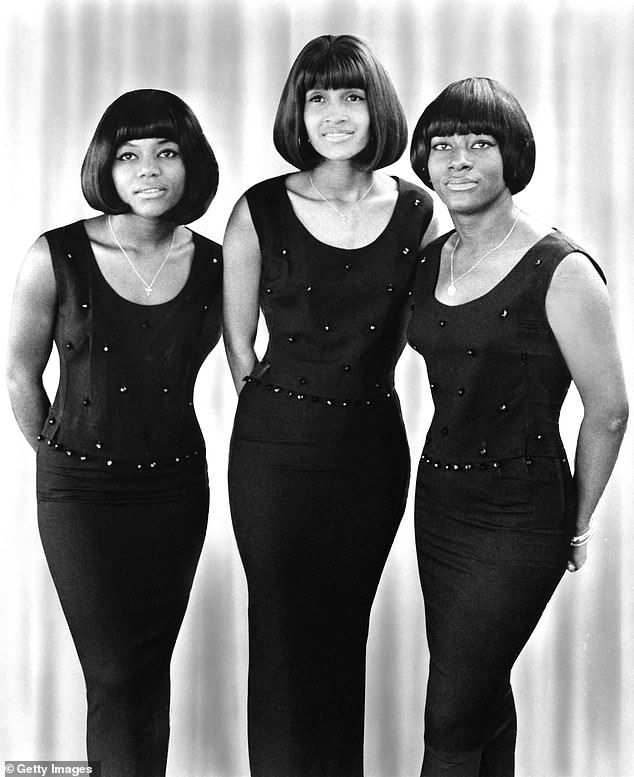
Pictured: Former Ike and Tina Turner backup singers and recording artists The Mirettes Jessie Smith (left), Robbie Montgomery (centre) and Venetta Fields (right)
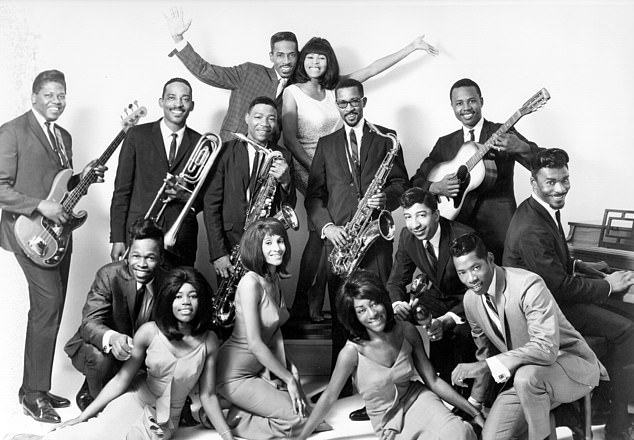
Along with praise for her musical legacy, fans have remembered how the iconic star broke the silence surrounding domestic abuse. Pictured: Husband-and-wife R&B duo Ike & Tina Turner (back) pose for a portrait with their band Ike & Tina Turner Revue in 1965
And while the violence always erupted behind closed doors, Robbie bore full witness to its aftermath – to the bruises, blood and humiliation.
Speaking to the Mail from her home in St Louis, Missouri, Robbie, now 82, tells me she is still riddled with guilt that she could not persuade Tina to leave Ike – and that she eventually chose to leave her beloved friend and pursue her own musical ambitions.
Indeed, it was a decision that Tina later confessed utterly devastated her too.
‘I always felt guilty that I left her, but I had to move on,’ Robbie tells me today, her voice halting with feeling.
The two women were in their early 20s when they met in St Louis in the late 1950s. They had much in common: Both had discovered music while singing as children in church choirs, and the young Robbie was a back-up singer for a group called The Artettes – which later became the Ikettes.
Tina, known as Ann (a shortened version of her full name, Anna Mae Bullock), was a back-up vocalist for Ike Turner and his Kings of Rhythm.

Speaking to the Mail from her home in St Louis, Missouri, Robbie (pictured), now 82, tells me she is still riddled with guilt that she could not persuade Tina to leave Ike
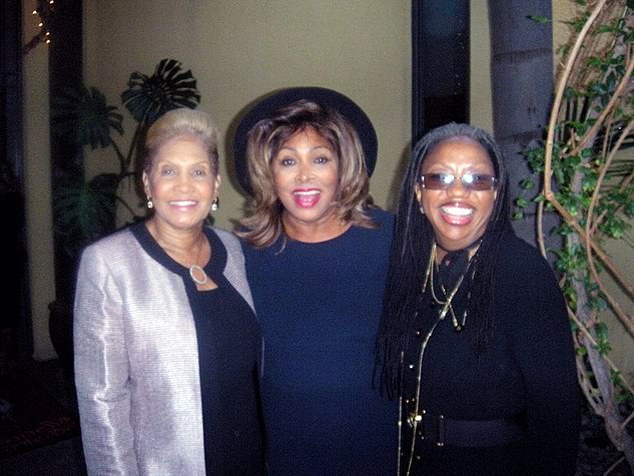
Pictured: Robbie Montgomery (left), Tina Turner (centre) & Joshie Jo Armsteadtaken (right)
After a singer failed to turn up at a recording session to sing A Fool In Love, a song written in 1960 by Ike, Tina went front stage while The Artettes sang back-up. The record eventually became a million-selling hit.
‘When we first met, [Tina] was a happy person. We were young and pursuing our dreams and the record was a hit, so it was a really good time for all of us. Even Ike was happy,’ says Robbie.
Yet the signs were already there: Commercial success saw Ike promptly turn his mind to business matters. Ann’s name was rapidly changed to Tina without her knowledge – he even trademarked it – and they formed the Ike and Tina Turner Revue.
By this point their platonic relationship had turned romantic, and Tina became pregnant with their son, Ronnie, born in October 1960. Tina already had another son, Craig, born in 1958 from a previous relationship.
Tina’s unhappiness about not being consulted about her name being changed, along with her reluctance to go on tour because she was pregnant, sparked the first violent episode.
As she recalled in a 2013 interview with Oprah: ‘If you fight [with your hands] you can’t play guitar, so he always fought with something and he hit me on the head with a wooden shoe stretcher.
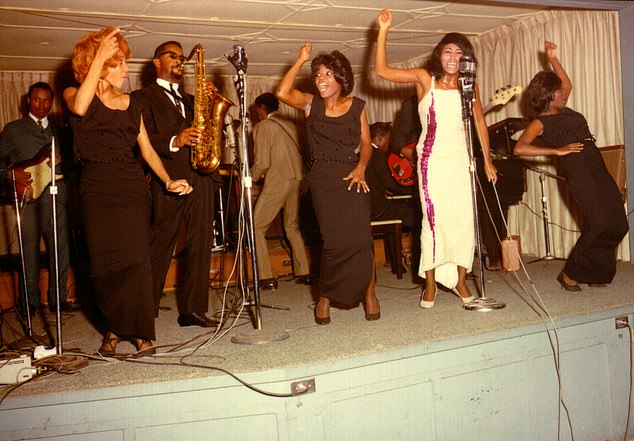
By this point their platonic relationship had turned romantic, and Tina became pregnant with their son, Ronnie, born in October 1960. Pictured: Ike & Tina Turner perform onstage in 1964 in Dallas Fort Worth, Texas
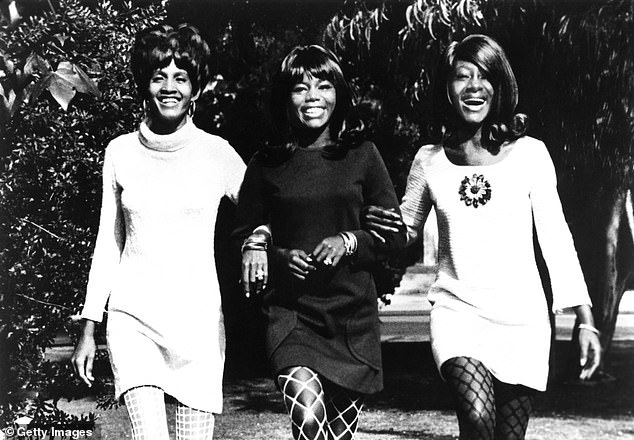
Pictured: former Ike and Tina Turner backup singers and recording artists The Mirettes Robbie Montgomery (left), Jessie Smith (centre) and Venetta Fields (right)
‘It really hurt… and then the beating came. I was down on the floor by then. I really started to cry and he said “Get into bed.”
Oh, that was really awful… we went through with that and then I laid there with a swollen head feeling like, ‘You have really got yourself into something.’
After giving birth to her own child, Robbie joined the tour – a gruelling series of one-nighters across America’s segregated south.
For a while she was unaware of the volcanic nature of her friend’s marriage. It was her first time away from home and, initially, it all seemed like an adventure.
‘We didn’t have restaurants we could go into, and a lot of hotels wouldn’t accept us. We girls couldn’t go to a hair salon and get our hair done, so we all stuck together. There were about 20 of us and we were like a family,’ Robbie recalls.
‘We had an electric skillet to cook in hotel rooms and I was the designated cook. I knew how to fix everything in one pot.’
Although Robbie had yet to learn about Ike’s violence, she acknowledges: ‘I thought he was mean. But he was the boss, and you do what the boss says. The boss picked the songs, the boss told us where we were playing, the boss picked the hotels, the boss did everything. We were ambitious and glad to be pursuing our dreams. This was our opportunity.’
Soon, however, she realised her friend was being terrorised. ‘I never saw him hit her. He never did it in front of us because we’d have stopped it. This thing took place in their hotel rooms or in their home,’ she says.
‘But I and the others [in the group] saw the aftermath – the black eyes, the bruises. We always knew when they had a fight because she would tell us. Sometimes she was upset and sometimes she wasn’t. She was a very strong woman, even then. She performed and she covered it up.’
Unsurprisingly, the atmosphere became tense. ‘It became difficult. She was like a sister to me, and I would be really upset knowing they’d had these altercations.

For a while she was unaware of the volcanic nature of her friend’s marriage. It was her first time away from home and, initially, it all seemed like an adventure. Pictured: Robbie Montgomery in 1965
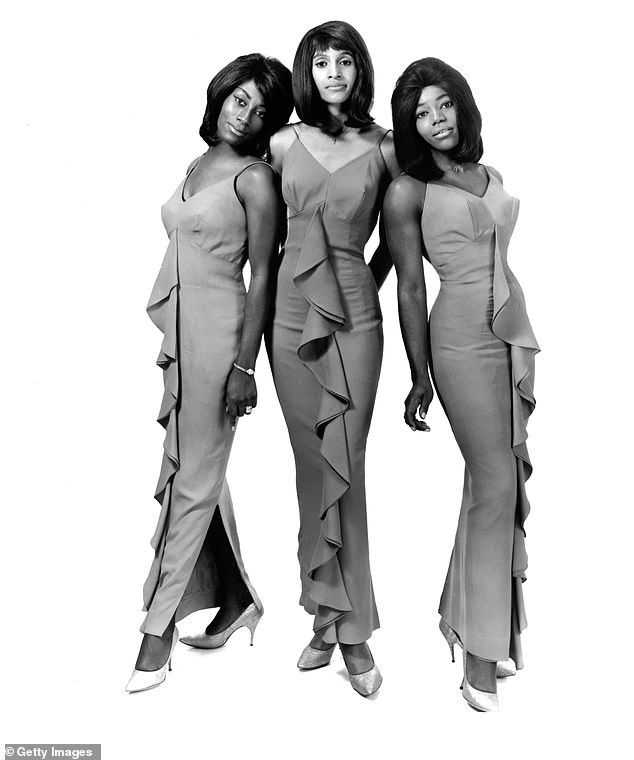
Pictured: Ike and Tina Turner backup singers and recording artists The Ikettes Venetta Fields (left), Robbie Montgomery (centre) and Jessie Smith (right)
‘I would ask her, ‘Why don’t you leave him?’ I was on her side, naturally. I’d call him a mother-f*****. She’d say, ‘Don’t talk to me about that because I know what I’m doing and when the time comes, I will leave him.’
Such was Ike’s domination of his wife, Tina was even forced to ask Robbie for money. ‘We had salaries. It wasn’t much – maybe a hundred dollars every time we performed – but she didn’t have any money herself because Ike controlled their money… I’d give it to her. I wasn’t expecting her to pay me back, but she did.’
Even in these days, Robbie says she and the other musicians believed Tina was a star in waiting.
‘She was a singer who was before her time, with that great big voice of hers and the wild dancing,’ she laughs. ‘We all knew for her to have a big opportunity she’d have to leave Ike.’
Regardless, Tina remained at Ike’s side, much to Robbie’s frustration.
‘There were times when Ike would shout at her and was fussin’ at her and then we’d get mad at him, and when we weren’t speaking to him, she couldn’t speak to us,’ says Robbie.
Her pleas to her friend to leave her husband continued – but fell on deaf ears.
‘Finally, we all just stopped saying anything to her and just tried to be sympathetic to her when they had fights. She wasn’t going to go until she was ready, so we had to respect what she was saying and accept it. I couldn’t influence her staying. I couldn’t influence her leaving. I couldn’t control anything that happened.’
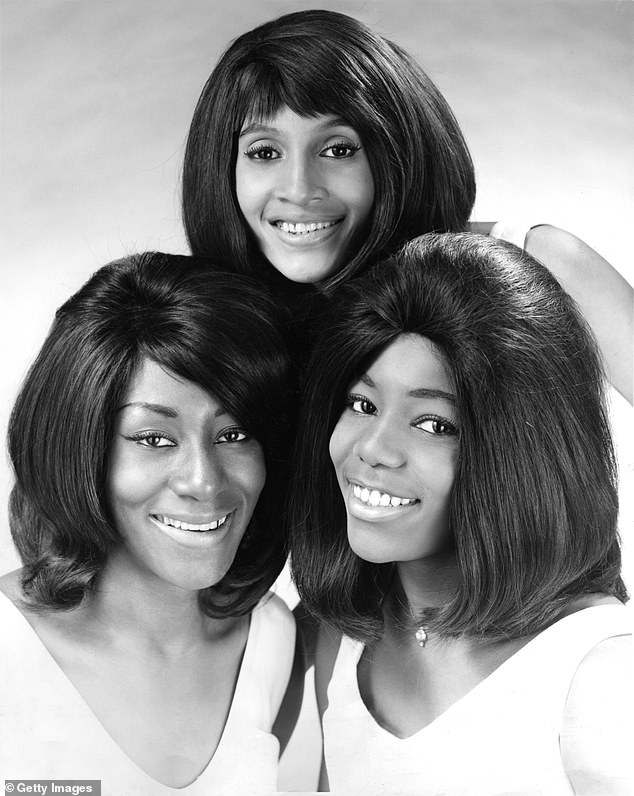
Such was Ike’s domination of his wife, Tina was even forced to ask Robbie (centre) for money
Robbie says she and her fellow singers came to realise that even if Tina wasn’t going, the moment had come for them to leave – or they would always be stuck as Ike’s backing singers.
‘We knew we were going to move on. We were just waiting for the right time,’ she says.
That moment came in 1965. ‘It was a hurting thing when we left because we didn’t want to leave her. I wouldn’t be there to hear her stories and be there in support of her, but she wasn’t ready to leave so we had to pursue our own happiness. Ike was all about control – with her and with us.’
Leaving the group was painful for her, and for Tina, remembers Robbie.
In her interview with Oprah a decade before her death, the legendary singer revealed her sorrow at the break-up.
‘Robbie was a support for me in those dark days,’ she said. ‘Robbie was like a sister when she was an Ikette… and when Robbie left, I missed her so much. I don’t mean to cry but it just comes up. Robbie and I were very close.’
Tina’s words were wounding for Robbie. ‘That was devastating to me,’ she says. ‘She was like a sister to me and we always had a love for each other but we went our separate ways.
‘I always felt guilty that I left her, but I had to move on and sometimes, things happen for a reason. She had to leave him to achieve that international level of superstardom that she always wanted.’
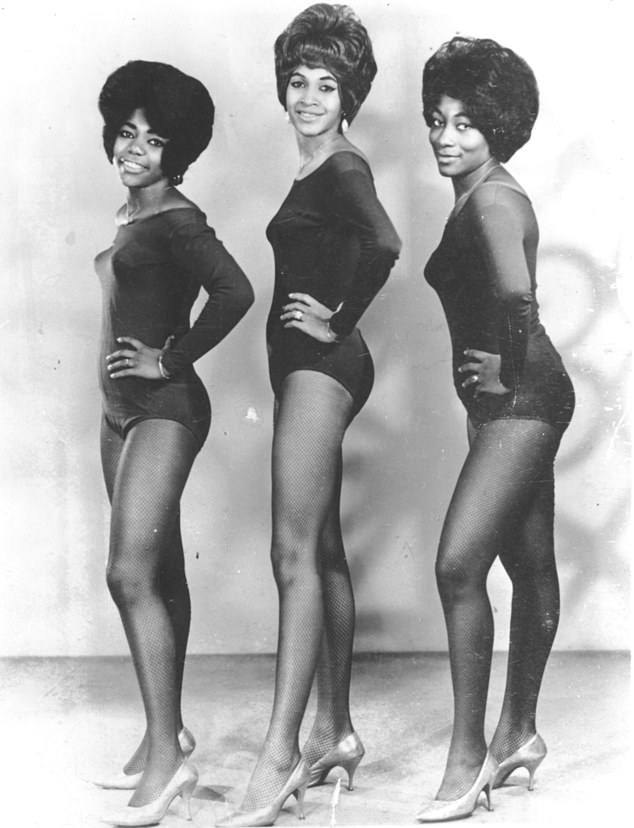
Leaving the group was painful for her, and for Tina, remembers Robbie (pictured, centre)
Robbie went on to be a backing vocalist for many big stars, including Stevie Wonder, Barbra Streisand, The Rolling Stones and Joe Cocker.
Tina, however, faced many dark days after Robbie left, before she could say she was truly free of Ike. Indeed, one of the lowest came in 1968, when she tried to take her own life with an overdose of sleeping pills. Her stomach was pumped in hospital. Ike came to her hospital bed the next day and forced her back to work.
After more years of mental and physical torment, Tina fled her marriage in 1976 in the middle of the night while the couple were in Dallas, Texas. ‘I wound up on a freeway and I ran across that into a Ramada Inn,’ she recalled.
One of her eyes was swollen shut after yet another beating, and she had intentionally left her trademark wig behind.
She told the hotel manager that she was Tina Turner, said she had left her husband and that she had no money to pay for a room, but would reimburse him when she could. In her pocket was just 36 cents and a petrol station loyalty card.
Tina’s divorce was finalised in 1978 after a legal battle which saw her win back control of her own name from Ike.
Six years later, she would release the album Private Dancer, which became the biggest hit of her career. Her place as an international superstar was sealed. Love followed when she met Erwin Bach, a record industry executive, who became her second husband in 2013 after 27 years together. A more peaceful life was ushered in when they moved to Switzerland.
Ike, meanwhile, died in 2007 of a cocaine overdose. His ex-wife did not attend his funeral.
Tina and Robbie kept in touch over the years, despite the physical distance between them.
‘I was devastated when Tina died. I knew she was very ill, and she always used to say she was going to live till she was a hundred and I’d say I was going to live till I was 104,’ says Robbie.
‘She had been in poor health and stopped coming to America, so I used to go to Nutbush, where she was born, to represent her and the Ikettes at the museum that has been built there in her honour.’
In her ninth decade, Robbie has her own plans. Once a successful restauranteur, with a chain called Sweetie Pie serving soul food that has since closed, she plans to open at least one again in her hometown where she is fondly known as Miss Robbie. The impressive octogenarian is also recording an album.
‘Tina was a role model for me and so many women because she pursed her dreams, no matter what difficulties she faced. So, I don’t think it’s too late for me to pursue my dreams of being a singer again,’ she chuckles.
Today, six decades after she first met the woman who would become Tina Turner, Robbie says there will never be another musical star like her.
‘She was a trailblazer, a go-getter. She was unique and no one can replace her. Her music will live on, I’m sure of that.’
Read the full article here











